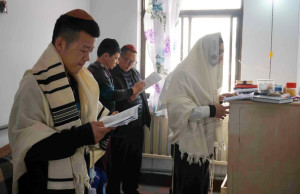By BECKY DAVIS APRIL 6, 2015 9:37 AM April 6, 2015 9:37 am
 Barnaby Yeh of the Sino-Judaic Institute leads morning prayers for Jewish descendants in Kaifeng.Credit Becky Davis/The New York Times
Barnaby Yeh of the Sino-Judaic Institute leads morning prayers for Jewish descendants in Kaifeng.Credit Becky Davis/The New York Times
Over the remains of the Chinese-style Passover banquet – soups with bamboo and huge chunks of fresh tofu, steamed fish and platters of crisp greens in mustard sauce – Li Pengling, 16, lifted a glass of Israeli wine from his place at the head table. Quietly but without faltering, he read out a Chinese translation of a Hebrew prayer.
About 50 guests, including several local government officials, responded with a chorus of amens, downing their thimblefuls of wine while self-consciously leaning to the left. Some poked neighbors who, unfamiliar with the Jewish custom, had neglected to incline.
It was an atypical scene on an atypical occasion: a Chinese celebration of Passover, the Jewish holiday commemorating the liberation of the Israelites from slavery in Egypt more than 3,000 years ago.
In a hotel dining room festooned with purple garlands for a coming wedding, Chinese of Jewish descent in the central city of Kaifeng came together on Friday night for a Seder, the traditional Passover meal over which the Exodus story is recounted. Just two days before Qingming, the “tomb-sweeping” festival when Chinese traditionally pay their respects at family graves, they had gathered to recall ancestors even more ancient and a world away.
The millennium-old Jewish population of Kaifeng has witnessed a surprising revival in recent years, a phenomenon all the more notable for the tolerant eye that the Chinese government, which does not count Judaism among state-sanctioned religions, seems to have turned toward it.
Eight clans in Kaifeng claim to be able to trace their lineage back to a small number of Sephardic Jews who made this fertile region their home in the 12th century, when Kaifeng was the capital of the Northern Sung Dynasty and a bustling hub on the Silk Road. But intermarriage, assimilation and isolation eroded their numbers over time. Floods and fires repeatedly destroyed the city’s synagogue, which was not rebuilt after a flood in the 1850s. The Cultural Revolution in the 1960s further quashed any lingering expressions of religious practice.
These days, Jewish visitors and organizations from the United States and Israel come to the city seeking traces of the ancient Jewish settlers, financing a small Jewish community center and paying for the immigration to Israel of 15 people from Kaifeng. The Chinese government’s acceptance comes as Israel and China are actively seeking closer business ties, including in Kaifeng.
Mr. Li, one of the leaders of Friday’s Seder, said he was using this reawakening tradition to better understand the past and the wider modern world.
He said Torah study had been a way for him to learn about the world beyond Kaifeng and the strict Chinese education system. “When I’m at school studying what the teachers require, it’s like I’m stuck in a big house,” he said. “But I can use all this as a small window to see what life is like on the outside.”
For him, the story of Passover resonates in a particularly Chinese context. “I can use what I know about the conditions in China during the Anti-Japanese War,” he said, referring to the conflict from 1937 to 1945, “and imagine those of the Jewish people as they fled the Egyptian pharaoh’s control.”
For detail please visit here
